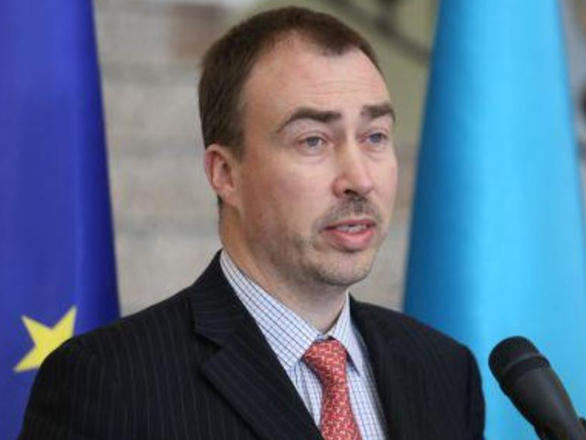Toivo Klaar: EU hopes for substantive talks on Karabakh conflict as soon as feasible

By Sara Israfilbayova
The European Union hopes for speedy substantive negotiations to resolve the Armenia-Azerbaijan Nagorno-Karabakh conflict.
EU Special Representative for the South Caucasus and the crisis in Georgia Toivo Klaar, who is on a visit to Baku, told Trend that the EU welcomes the reduction of tensions and the constructive approach of the leadership of Azerbaijan and Armenia to the conflict resolution.
“The EU hopes that this will be accompanied by concrete and substantive negotiations as soon as feasible, with the aim to move towards the peaceful resolution of the conflict on the basis of mutual compromises,” said Klaar.
He noted that in this regard, the EU supports the efforts undertaken by the OSCE Minsk Group Co-Chairs.
Moreover, Spokesperson for the EU Special Representative Henri Duquenne told Trend that Klaar will have meetings with the Foreign Minister, the Defence Minister and the Chairman of the State Committee for Refugees and IDPs today and tomorrow.
The OSCE MG Co-Chairs have recently been on a tour to the region. In Baku, they met with President Ilham Aliyev and Minister of Defense Colonel General Zakir Hasanov, representatives of Azerbaijani communities affected by the conflict.
The Co-Chairs of the OSCE Minsk Group stressed the importance of sustaining a climate of trust for intensive negotiations on the settlement of the Nagorno-Karabakh conflict, said the statement of the Co-Chairs following their visit.
In their meetings with the Co-Chairs, the leaders of Azerbaijan and Armenia confirmed that the level of violence has fallen significantly since they reaffirmed in Dushanbe their commitment to reduce tensions. In their consultations, the Co-Chairs received additional details about the implementation of the Dushanbe understanding, including with regard to the establishment of direct communication links.
The Co-Chairs welcomed these developments, commended the sides for implementing constructive measures in good faith, and expressed support for the leaders’ readiness to continue their dialogue.
The Co-Chairs stressed the importance of sustaining a climate of trust for intensive negotiations on the settlement of the Nagorno-Karabakh conflict.
Since 1992, the Nagorno-Karabakh conflict has become predominantly a problem of international importance. After Azerbaijan became a member of the Conference for Security and Cooperation in Europe (CSCE), in accordance with the principles of this organization, the solution of the Nagorno-Karabakh conflict was in the focus of public participants. Soon, the OSCE Minsk Group was established for the settlement of the conflict.
Negotiations for a peaceful settlement of the Nagorno-Karabakh conflict are still underway within the framework of the OSCE Minsk Group. Azerbaijan insists on maintaining its territorial integrity, Armenia defends the interests of the unrecognized Nagorno-Karabakh Republic and rejects implementing four UN Security Council resolutions on withdrawal of its armed forces from Nagorno-Karabakh and surrounding regions.
Armenia captured Nagorno-Karabakh and seven surrounding regions from Azerbaijan in a war that followed the Soviet breakup in 1991. More than 20,000 Azerbaijanis were killed and nearly 1 million were displaced as a result of the war.
Large-scale hostilities ended with a Russia-brokered ceasefire in 1994, but Armenia continued the occupation in defiance of four UN Security Council resolutions calling for immediate and unconditional withdrawal.
Unfortunately, peace talks mediated by Russia, France and the U.S. within the OSCE Minsk Group have produced no tangible results so far due to Armenia's unconstructive position on the issue.
---
Follow us on Twitter @AzerNewsAz
